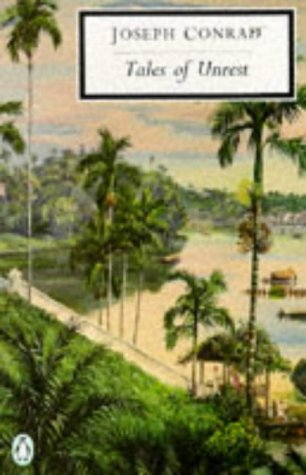

 |

|

The average rating for Tales of Unrest based on 2 reviews is 3.5 stars.
Review # 1 was written on 2016-03-19 00:00:00 Darko Kelemin Darko KeleminA hidden gem of Conrad mastery. This collection of short works represent some of Conrad�s earlier work. First published in 1898, four of the five stories had been previously published. A reader will find many of Conrad�s most frequently explored themes: isolation, distinctions between East and West, between colonial and native, a discernment and critique of civilization. But these shorter works also reflect his sharp observation of human nature and his adept ability to dissect relationships. "Karain: A Memory" � similar in tone to Lord Jim, this also highlights the duality of Conrad�s views on racism. A Malaysian hero is memorialized by Western friends. Set in Brittany "The Idiots" is perhaps his most dated work, possibly more anachronistically non politically correct than his use of the �N� word. Here, Conrad describes a family cursed with mental illness in the French countryside and how the inchoate difficulties unravel the parents. Subtly disturbing. "An Outpost of Progress" � In the Heart of Darkness segment of his canon, this describes a trading post in the heart of the jungle. Deep up an in country river, two unlikely custodians, maintain an outpost and the tension of loneliness and of the suffocating forest gets to them both. "The Return" � may be the surprise jewel of this crown. Very much dissimilar to any of his works, like Amy Foster in that regard, far afield from any of his ubiquitous themes, this one will stay with me, partly because of the high quality of his prose and also partly because it is so out of character. His virtuosity with imagery and with psychological characterization is in full force in this novella (the longest work in the collection). Conrad captures the essence of the dynamics of infidelity that would make modern writers like Stephen King and Richard Mathieson envious. Yet at the same time, if looked at from a slightly different angle �The Return� embodies and fairly represents his body of work in that he examines as with a sharp instrument the subtle and fragile superficiality of what we call civilization. In tone and design this is also reminiscent of August Strindberg�s Miss Julie. "The Lagoon" � A very short work, almost a sketch of native power and influence. Reminiscent of Melville or Jack London�s south seas stories. I had heard of some of these stories before and I am glad to have found them all in one cover. This would make a good introduction for a new reader and a fan of Conrad, I am one, will want to know this work. |
Review # 2 was written on 2013-04-29 00:00:00 Philip Nable Philip NableThe stories here are from Conrad's early period, in the last decade of 19th century. Given below are my ratings for each of them, along with the setting. Karain: a memory - 4 (Malaya) The Idiots - 4.5 (Rural France) An Outpost of Progress - 5 (Congo) The Return - 4.5 (London) The Lagoon - 3 (Malaya) Of these, An Outpost of Progress stands out, and can be read as a sort of precursor to Heart of Darkness. In the story, we see the disintegration that befalls when white men stay in an outpost in dark dark Africa. The general collapse toward some sort of hysteria / insanity remains a common theme in all the stories. And except the Congo story, the Woman remains an enigmatic locus, at once the object of desire and the agency of deception and folly. As far as the writing goes, it is top notch, if one focuses on the turn of phrases and the metaphors more than the statis that Conrad forces on his scenes. Let me give some sentences from the story 'The Return' The inner circle train from the City rushed impetuously out of a black hole and pulled up with a discordant, grinding racket in the smirched twilight of a West-End station. She strode like a grenadier, was strong and upright like an obelisk, had a beautiful face, a candid brow, pure eyes, and not a thought of her own in her head. There are in life events, contacts, glimpses, that seem brutally to bring all the past to a close. There is a shock and a crash, as of a gate flung to behind one by the perfidious hand of fate. Go and seek another paradise, fool or sage. There is a moment of dumb dismay, and the wanderings must begin again; the painful explaining away of facts, the feverish raking up of illusions, the cultivation of a fresh crop of lies in the sweat of one's brow, to sustain life, to make it supportable, to make it fair, so as to hand intact to another generation of blind wanderers the charming legend of a heartless country, of a promised land, all flowers and blessings . . . He stood in the revealing night�in the darkness that tries the hearts, in the night useless for the work of men, but in which their gaze, undazzled by the sunshine of covetous days, wanders sometimes as far as the stars. Reading Conrad is perhaps acknowledging two things - (1) The necessary abstinence from venturing into that which is impossible to know, and the necessity of making peace with that impossibility, whether that be the mores and customs of another race or the absurdity of women (Conrad's idea, not mine) (2) The old notion that a lot of work needs to go into making a descriptive sentence, and that it has to be long. All in all, depending on your attention levels in various paragraphs, your reactions will vary. You'll feel subject to sublime art in some places, and skim over many others. The essence of the stories won't be missed though - promise. |
CAN'T FIND WHAT YOU'RE LOOKING FOR? CLICK HERE!!!